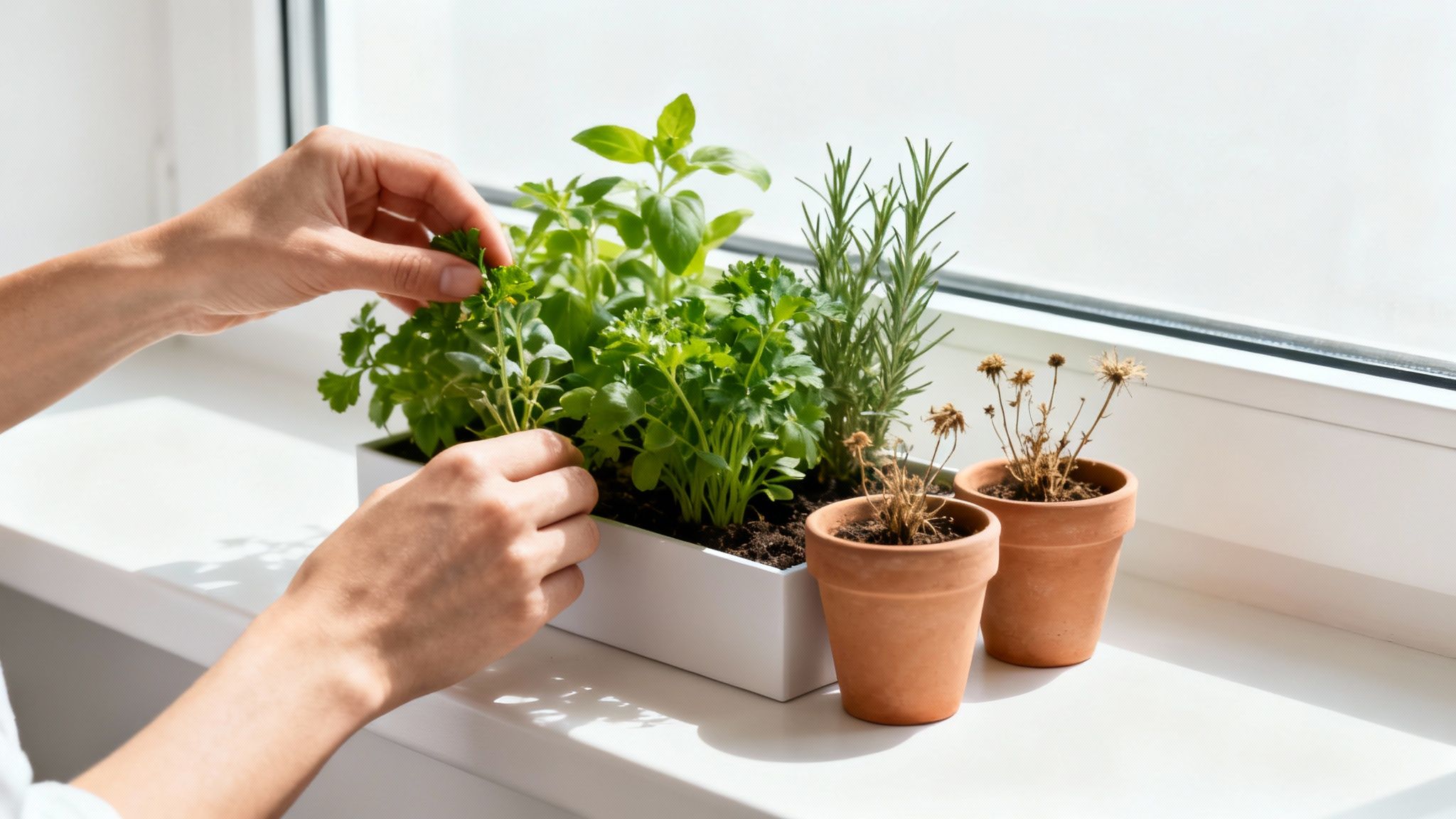Bloated stomach probiotics: Find relief with the right strains
Ever feel like your stomach inflates like a balloon by afternoon? You’re not alone-and it’s not just what you ate. That persistent, uncomfortable pressure can completely throw off your day, turning a great mood into a frustrating one. We get it, and we're here to help you get past that feeling for good.
This guide is your roadmap to figuring out what’s really causing your bloating and, more importantly, how to find lasting relief. We’re going to skip the generic advice and dive into the real connection between your bloated stomach, probiotics, and the unique community of microbes living in your gut.
Your Guide to Beating the Bloat for Good
Think of this as a friendly conversation about your gut health. We’ll break down the science into simple, easy-to-understand terms and give you practical steps you can start using right away.
What You Will Learn
Here's what we'll cover so you can finally feel in control of your digestive health:
- The common culprits behind that frustratingly bloated feeling.
- How specific probiotics work as reinforcements for your digestive system.
- Which probiotic strains have solid scientific evidence for beating bloat.
- Simple, everyday habits to support a happy, balanced gut.
Our mission is to arm you with the knowledge you need. Along the way, we'll explain how targeted, plant-based probiotics-like the ones we’ve spent years carefully crafting here at Yuve-can be a powerful tool for restoring that peaceful gut feeling.
A Note from Our Founder, Sam: "My own journey with digestive issues is what inspired me to start Yuve. I was just tired of feeling uncomfortable and overthinking every meal. Finding the right probiotic strains was a genuine turning point, and I wanted to share that feeling of relief with everyone who felt as lost as I did."
Feeling good shouldn't be a mystery. Once you understand the root causes and learn how to support your gut, you can say goodbye to that afternoon balloon. Let's get started.
What’s Really Behind That Uncomfortable Bloat?

Let's talk about that frustrating, tight, and puffy feeling in your stomach. It can make you second-guess every single thing you ate, but bloating is rarely just about one meal. More often, it's a signal from your body that something deeper is going on with your digestive system.
Think of your gut as a delicate ecosystem. When it's balanced and thriving, everything runs smoothly. But when a few key things get thrown off, you start to feel the effects almost immediately.
The Gut Ecosystem Imbalance
One of the most frequent reasons for a bloated stomach is a condition called gut dysbiosis. It sounds technical, but all it really means is that the community of good and bad bacteria in your gut has been thrown out of whack.
The good bacteria help break down food and keep things healthy. The bad bacteria? They're like weeds. Give them half a chance, and they’ll take over, producing excess gas and causing that uncomfortable bloating. When the weeds start to outnumber the flowers, your whole gut ecosystem suffers.
The Digestive Traffic Jam
Ever feel like your last meal is just sitting in your stomach like a lead weight? That's often a sign of slow gut motility-basically, a "food traffic jam" inside your digestive tract.
Your digestive system is built to keep things moving at a steady pace. When that process slows down, food hangs around in your intestines for too long. This gives disruptive bacteria more time to ferment it, which leads to a buildup of gas, pressure, and that all-too-familiar swollen belly.
Key Takeaway: A bloated stomach is usually a symptom, not the root problem. It’s your body's way of telling you there's an imbalance in your gut's ecosystem or a slowdown in its natural rhythm.
Food Triggers and Sensitivities
Of course, what you eat matters. A lot. Certain foods are famous for producing gas, especially those loaded with specific types of fiber and sugars that can be difficult for some of us to digest.
A few of the usual suspects include:
- Legumes and Beans: They’re incredibly healthy but notorious for causing gas because your gut bacteria have to work overtime to break them down.
- Dairy Products: A huge number of people have trouble digesting lactose, the natural sugar in milk, which can lead to significant bloating.
- Cruciferous Vegetables: Broccoli, cauliflower, and Brussels sprouts are nutritional powerhouses, but they also contain complex sugars that can cause gas. Yikes!
This isn't about avoiding these healthy foods forever, but rather understanding how your individual body reacts. For a deeper dive, check out our guide on common foods that cause bloating to help pinpoint your personal triggers.
Once you start to understand these root causes, you can stop the frustrating guesswork and begin addressing the real source of your discomfort.
How Probiotics Can Tame Your Bloated Stomach
We've covered what's causing that frustrating, balloon-like feeling. Now, let’s talk about a real solution: probiotics. If your gut is a garden, bloating is a sign that weeds (disruptive bacteria) are taking over. Probiotics are like bringing in skilled gardeners to help restore balance.
It’s not magic; it’s biology. These tiny but powerful organisms go to work in a few key ways. They help rebalance your gut's ecosystem, make digestion more efficient, and promote smoother, more regular digestive transit.
Restoring Your Gut’s Natural Balance
At its heart, a probiotic’s job is to bring your gut back into harmony. When those disruptive, gas-producing bacteria are having a party in your digestive tract, they ferment undigested food and create a lot of excess gas. That's a huge reason you feel so uncomfortably full.
Probiotics step in to essentially crowd out the troublemakers. By increasing the population of beneficial bacteria, they leave less space and fewer resources for the unwanted microbes to thrive. This simple act of rebalancing can dramatically cut down on gas and bloating.
Supporting Smoother Digestion
A balanced gut is an efficient one. Probiotics are fantastic helpers when it comes to breaking down your food more effectively. Certain strains even produce their own enzymes that give your body a hand in digesting tricky things like lactose or complex fibers.
When food is broken down properly, it moves through your system at a healthy, steady pace. This prevents the "food traffic jam" that leads to fermentation and gas. The end result? Less pressure and a much calmer gut.
A Founder's Story: "For years, I felt like I was at war with my own stomach. I'd eat a healthy meal and still end up bloated. It was so frustrating. Discovering the power of specific probiotic strains was a complete game-changer. It wasn’t just about relief; it was about getting my freedom back-the freedom to enjoy food without fear. That personal victory is the reason Yuve exists today." - Sam, Yuve Founder
Science Corner: A Look at the Evidence
It’s one thing for us to talk about how this works, but the science really brings it home. The research is compelling.
A major review of 17 high-quality studies involving over 1,200 patients found that probiotics significantly reduced bloating for people with IBS and other functional gut disorders. You can read the full research about these bloating studies here.
What this means for you is simple: this isn't just wishful thinking. Solid scientific evidence shows that introducing the right bacteria can bring real, measurable relief. Taking a high-quality, targeted probiotic is a proactive strategy for nurturing your gut health. This is precisely why we’ve formulated Yuve’s Vegan Probiotic Gummies with specific, research-backed strains designed to promote digestive harmony.
The Best Probiotic Strains for Bloating Relief
Walking into the supplement aisle can feel overwhelming. With dozens of bottles promising gut bliss, how do you choose? The secret isn’t just grabbing any probiotic; it’s about picking the right probiotic strains for the job-especially when that job is to beat a bloated stomach.
Think of it this way: different probiotic strains are like specialized workers, each with a unique skill. For bloating, we need to bring in the specialists.

As you can see, introducing targeted probiotics acts as the bridge between discomfort and relief by actively restoring your gut’s natural harmony.
The A-Team: Superstar Strains for a Bloat-Free Belly
Not all heroes wear capes-some are microscopic. When it comes to tackling the gas and pressure of bloating, a few specific strains have been studied time and again for their effectiveness. Let’s meet the key players.
Top Probiotic Strains for Fighting Bloat
| Probiotic Strain | Primary Benefit for Bloating | Best For... |
|---|---|---|
| Lactobacillus plantarum | Reduces gas production by calming disruptive gut bacteria. | Bloating primarily caused by excess gas and fermentation. |
| Bifidobacterium lactis | Improves gut motility, helping move food and waste through. | Sluggish digestion, constipation, and pressure buildup. |
| Bacillus coagulans | A resilient strain that survives stomach acid to reduce pain. | General IBS-related bloating, gas, and abdominal discomfort. |
Each of these strains offers a targeted approach, moving beyond a one-size-fits-all solution to address the specific reasons you might be feeling bloated.
At Yuve, we don’t believe in guesswork. That’s why our formulas are built around specific, evidence-backed strains like these. We focus on what’s been clinically shown to work, so you can feel confident you’re giving your body the support it actually needs.
What Does the Science Say?
A huge review that analyzed data from over 4,000 patients found that probiotics significantly improved IBS symptoms, including bloating. The study showed that nearly 50% of patients taking probiotics experienced symptom improvement, compared to just 32% in the placebo group. You can read more about these important probiotic findings.
What this means for you: Choosing a probiotic with the right strains isn't just a hopeful guess; it's a strategy backed by solid clinical evidence. You’re actively stacking the odds in your favor for finding real relief.
Putting It All Together for Your Gut
So, how do you pick the right strain for you? It really comes down to the root cause of your bloating.
- If your bloating feels like it's mostly from excessive gas, a strain like Lactobacillus plantarum can be a game-changer.
- If you're dealing with a slow, sluggish system, Bifidobacterium lactis can help get things moving again.
- For general IBS-related bloating and discomfort, Bacillus coagulans is an excellent all-around choice.
Understanding these differences is key. If you want to dive even deeper into how these tiny helpers work, our guide on probiotics for excessive gas has you covered.
How to Choose a High-Quality Probiotic
Walking into the supplement aisle can feel like a pop quiz you didn’t study for. With so many bottles and flashy labels, how do you pick a probiotic that will actually help your bloated stomach? Let’s be honest, it's overwhelming. But you don’t need a science degree-you just need a simple checklist.
We're going to decode the label together so you can feel confident in your choice. This is how you find a probiotic that works for you.
Look for an Effective Dose (CFU Count)
One of the first things you'll see on a probiotic label is CFU, which stands for Colony Forming Units. Think of this as the number of living, active bacteria in each dose.
While a bigger number isn't always better, you want a dose that’s been shown to be effective. Solid clinical evidence shows that helpful daily regimens often fall between 5 to 40 billion CFUs. This range ensures enough of the good guys survive the journey through your stomach acid to make a real difference.
Prioritize Strain Diversity and Specificity
Next, look at the specific strains listed. A high-quality formula will name the specific strains it contains (like Lactobacillus plantarum), not just the general family (like Lactobacillus).
A quality probiotic is specific. It’s the difference between hiring a "general contractor" versus a "master plumber" to fix a leaky pipe. For bloating, you want the specialists who know exactly how to handle the job.
Look for a blend of different, well-researched strains. A multi-strain formula often provides broader benefits, as different bacteria perform different jobs to support your overall gut harmony.
Check for Prebiotics
Probiotics are living organisms, and just like any living thing, they need food to thrive. That’s where prebiotics come in. Prebiotics are specific types of fiber that act as fuel for your good gut bacteria, helping them grow and flourish. A supplement that includes prebiotics is a sign of a thoughtful, effective formula.
Insist on Clean Ingredients
Finally, what’s not in your probiotic is just as important as what is. At Yuve, we believe supplements should be clean, pure, and aligned with a healthy lifestyle. That means looking for a product that is:
- Vegan and Plant-Based: No animal-derived ingredients, period.
- Non-GMO: Free from genetically modified organisms.
- Free from Common Allergens: No gluten, gelatin, or unnecessary artificial fillers.
When choosing a high-quality probiotic, knowing where to source your supplements is essential, and you might find it helpful to explore options like finding a trusted organic health store. A proactive step is to incorporate a targeted supplement like Yuve's Vegan Probiotic Gummies, which includes beneficial probiotics designed to support your gut from all angles, ensuring you get a comprehensive solution for bloating and digestive comfort.
Daily Habits to Maximize Your Probiotic Benefits
Taking a high-quality probiotic is a fantastic first step, but it’s not the whole story. Think of it like this: you’ve just invited beneficial guests (the probiotics) into your home (your gut). Now, you need to create the most welcoming environment possible so they can thrive.
You can amplify the benefits of your probiotic by pairing it with a few simple but powerful daily habits. These small adjustments work in tandem with your supplement, creating a holistic strategy for digestive harmony.
Quick Wins for a Happier Gut
- Chew Your Food Thoroughly: This signals your body to release digestive enzymes, which start breaking down food before it even hits your stomach.
- Slow Down at Mealtimes: Give your body a chance to register that it's full. Eating slowly helps prevent overeating, a super common trigger for bloating.
- Stay Hydrated: Water is absolutely essential for keeping everything moving smoothly through your digestive tract. Aim to sip consistently throughout the day.
- Eat More Prebiotics: Your new probiotic allies need food, and their favorite meal is prebiotics. Add foods like garlic, onions, bananas, and oats to your diet.
- Try Gentle Movement: A gentle walk after a meal stimulates your digestive system and can help relieve gas and pressure. A simple 15-minute stroll is perfect.
- Manage Stress: The gut-brain connection is incredibly strong. Incorporating simple techniques like deep breathing or meditation can have a surprisingly positive impact on your stomach.
These habits, combined with a targeted supplement like Yuve’s Vegan Probiotic Gummies, create a powerful synergy. The probiotics provide the reinforcements, while your lifestyle choices build the ideal environment for them to succeed. It’s a complete approach to help you finally beat the bloat.
FAQ: Your Top Questions About Probiotics and Bloating
Starting any new supplement can feel a bit uncertain, and we get it. To help clear things up, let's walk through some of the most common questions people have when it comes to tackling bloating with probiotics.
How long does it take to feel a difference?
While every gut is a little different, most people start to notice positive shifts-like less puffiness and more comfortable digestion-within 2 to 4 weeks of taking their probiotic every day. For a deeper dive, check out our guide on how long probiotics take to work. Patience and consistency are key.
Can probiotics make bloating worse at first?
It sounds backward, but yes, it’s possible to feel a bit more gassy or bloated when you first start. If this happens, don't worry-it’s usually a good sign. This temporary adjustment period often means the new good bacteria are actively displacing the less helpful microbes. This initial discomfort typically fades away within a week or two.
Is a multi-strain probiotic better?
When you’re fighting bloat, a formula with multiple strains is almost always the better choice. Different probiotic strains have different strengths; one might be a champion at reducing gas, while another excels at keeping your digestive system moving smoothly. By choosing a probiotic with several well-researched strains, you're covering more bases.
Can't I just get probiotics from food?
Fermented foods like kimchi, yogurt, and kefir are fantastic for your gut. But relying on them alone to fix a specific issue like bloating can be tricky. It's tough to get a consistent, high enough dose of the specific strains known to fight bloating just from what you eat. A high-quality supplement guarantees you're getting a targeted dose of the exact strains studied to help with a bloated stomach, day in and day out.
At Yuve, our mission is to take the guesswork out of feeling good. Our plant-based, thoughtfully crafted supplements are designed to provide targeted support, so you can get back to feeling like yourself.
Ready to find digestive comfort and leave bloating behind? Try Yuve's Vegan Probiotic Gummies and start your journey toward a happier gut today. We invite you to share your own gut-health journey in the comments below
